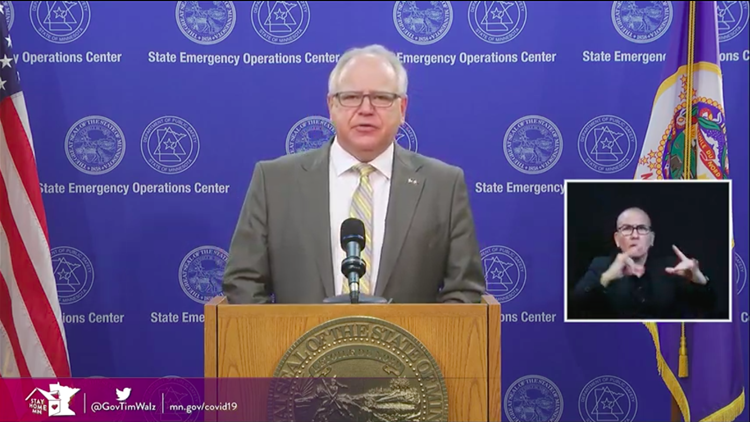Minnesota Legislature passes police reform, House Republicans sink bonding bill

Gov. Tim Walz gives a press conference on May 5 about the state’s response to COVID-19.
(The Center Square) – Nearly two months after the death of George Floyd while in police custody, the Minnesota Legislature approved police reform.
The House approved the bill 102-29 late Monday night, followed hours later by the Senate’s vote of 60-7.
The legislation includes:
- a ban on the use of “warrior” style training and chokeholds in most situations;
- Creating a Peace Officer Standards and Training board database of public anonymized peace officer data;
- Authorizing local municipalities to provide residency incentives for peace officers to live in the communities they serve;
- Establishing an independent use-of-force investigatory unit in the Bureau of Criminal Apprehension;
- A duty to intervene and report banned restraints;
- Improving trauma, mental health, and crisis intervention resources for officers.
Bill author Rep. Carlos Mariani, DFL- Saint Paul, the House Public Safety and Criminal Justice Reform Division chair, applauded the reform.
“Today, we’re beginning to make the overdue changes Minnesotans have been demanding to help ensure no more lives are lost due to police violence,” Mariani said in a statement.
“By passing this bill into law, we’re taking the first steps toward major changes to hold police officers accountable for harmful acts, and we are committed to continuing our work for safer communities. It wasn’t safe for George Floyd or for Philando Castile [shot and killed by a St. Anthony police officer during a traffic stop in 2016], and they deserved a better way to police that builds community.”
The reform follows worldwide protests after Floyd’s death, which resulted in calls to defund the police, as well as protests in Minneapolis to dismantle their police force.
The chambers couldn’t agree on reform measures during the first emergency special session.
“This bill reflects agreement, compromise, and puts the safety and well-being of Minnesotans first,” Senate Majority Leader Paul Gazelka, R- East Gull Lake, said in a statement.
“The Senate put forward common-sense reforms in June, and we are ending with common-sense reforms in July. We have the support of law enforcement to adopt and enforce these changes. Most importantly, there is nothing in this bill to defund, dismantle, or otherwise impede the ability of police officers to do their jobs.”
Gov. Tim Walz said he plans to sign the bills into law.
“George Floyd’s death brought the need for meaningful police reform into sharp focus for Minnesotans across the state,” Walz said in a statement.
“After decades of advocacy by communities of color and Indigenous communities, the bipartisan passage of these measures is a critical step toward justice. This is only the beginning. The work does not end today.”
But, to the chagrin of local city associations, the $1.9 bonding bill failed to gather the needed 81 votes, falling six votes short in the House as Republicans demanded Walz relinquish his emergency powers and include their caucus in negotiations.
“Instead of restoring the legislature’s role as a co-equal branch and crafting a bonding bill that can earn support from House Republicans, Democrats continue to push a bill that includes several poison pills that they know are non-starters for our caucus, including Bottineau Light Rail language and funding for a train to Duluth,” House Minority Leader Kurt Daudt, R-Crown, said in a statement.
Daudt said on the floor that lawmakers would likely return for a third special session in three weeks, at which time Walz may extend the peacetime emergency and the legislature and governor could attempt to pass the bonding bill.

